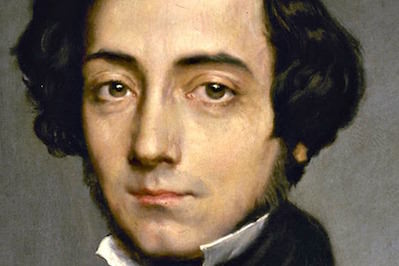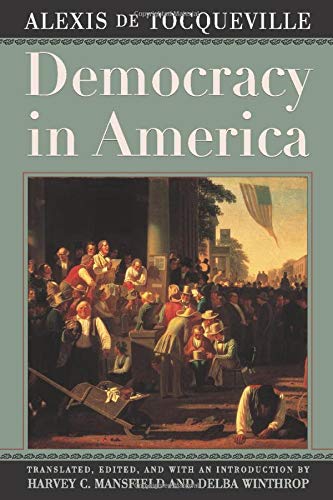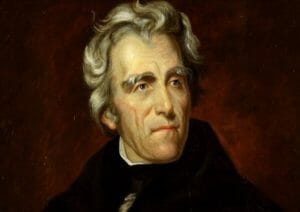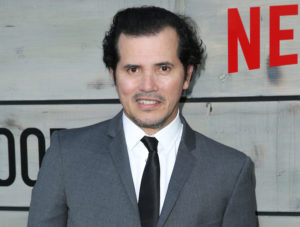‘Democracy in America’
"What good does it do me, after all," asks Alexis de Toqueville in his classic book, "if an ever-watchful authority races ahead of me to ward off all danger, sparing me the need even to think about such things, if that authority is also absolute master of my liberty and my life?".
Portrait by Théodore Chassériau
“Democracy in America” A book by Alexis de Tocqueville, translated by Arthur Goldhammer
I picked a hell of a year to become an American.
In late 2014, I rose to my feet in a Baltimore auditorium, alongside two dozen other immigrants from Africa, Asia, Europe and the Americas, and swore an oath to defend a nation. In return, that nation has surprised and challenged me every day since.
My first full year as a citizen of the United States was also the year Donald Trump made nativism a viable political project. It was the year college activists battled racism with their own peculiar intolerance. It was the year Rachel Dolezal was redefined, Atticus Finch rewritten, Caitlyn Jenner revealed. It was the year police shootings became viral, mass shootings became daily and same-sex marriage became law. It was a year America did little else, it seemed, than fight over values, identity, premises.
It’s exhausting, being American. Seriously, do you folks do this every year?
I’m not a recent arrival. I graduated from college here, got married here, built a family here. But only with citizenship did I grasp the distance I’d always kept. I left my native Peru behind 27 years ago, but whenever this country seemed too painful or complicated, I’d shake my head sagely. Estos gringos locos. Except now everything about the place — its virtues and excesses, its history and future — is all mine, too. For the first time, I feel the glorious burden of being American.
To carry it, I’ve realized I need help. Sure, I passed the citizenship test, even practicing the list of 100 questions with my kids. (They’ll ace elementary school civics now.) But for the advanced coursework, my instinct was to turn to a book. What could I read that would guide me through the chaos that is democracy in America?
Fortunately, there’s this little book called “Democracy in America” — written 175 years ago by, of all people, some know-it-all foreigner.
It’s embarrassing to admit that I’d never read Alexis de Tocqueville’s classic work until now, but I’m glad I picked this year to do it. Few books have been so often cited and imitated, so I won’t presume to offer more insight than this: “Democracy in America” is an ideal book to read as a new citizen. Yes, it’s really long and stuffed with annoying, self-referential French digressions. (I can say that sort of thing now, I’m American!) But it also explains perfectly to a brand-new compatriot so much of the essential minutiae of life here, so much of what America is and was, so much of what it risks losing.
“Democracy in America,” for example, explains why Americans always want you to join things and sign stuff. As soon as they welcome you to the whole, the parts start claiming you. It could be your race or ethnicity or sexual identity. Or your hobby, your school, your politics, your team. Where do you belong? Which identity is strong enough to get you to commit and be counted? With options multiplying, “American” is just the beginning.
Tocqueville obsesses over this freedom of association. “In America, citizens of the minority associate primarily to ascertain their numerical strength and thereby weaken the moral ascendancy of the majority,” he writes. “The second purpose of association is to promote competition among ideas in order to discover which arguments are most likely to make an impression on the majority, for the minority always hopes to attract enough additional support to become the majority and as such to wield power.”
I first grasped this when I arrived here after high school and collegiate groups tried to mark their territory. Would I join the Hispanic Americans organization? The international students? Pick! Now I get to vote, but I have to register with a party. In America, you’re always taking sides. “There is only one nation on earth where daily use is made of the unlimited freedom to associate for political ends,” Tocqueville writes. Americans not only use it daily but obsess over whether that’s enough. Bowling alone is frowned upon, FYI.
“Democracy in America” also notes that Americans go temporarily insane every election cycle. New citizens will be relieved or unnerved to learn that the 2016 campaign is not entirely unusual. Trump’s candidacy is an extreme instance; his proposals on immigration, terrorism and religion have eviscerated the boundaries of acceptable political speech — or maybe reflected the state of that speech more accurately than ever.“A presidential election in the United States may be looked upon as a time of national crisis,” Tocqueville writes. “Long before the date arrives, the election becomes everyone’s major, not to say sole, preoccupation. The ardor of the various factions intensifies, and whatever artificial passions the imagination can create in a happy and tranquil country make their presence felt. … As the election draws near, intrigues intensify, and agitation increases and spreads. The citizens divide into several camps, each behind its candidate. A fever grips the entire nation. The election becomes the daily grist of the public papers, the subject of private conversations, the aim of all activity.”
Normalcy recovers, he contends, once a verdict is rendered. “This ardor dissipates, calm is restored, and the river, having briefly overflowed its banks, returns peacefully to its bed. But is it not astonishing that such a storm could have arisen?” Yes. Every time.
“Democracy in America” also captures the fights between security and liberty, a battleground long before Edward Snowden and the National Security Agency, religious tests and Syrian refugees. “What good does it do me, after all,” Tocqueville asks, “if an ever-watchful authority keeps an eye out to ensure that my pleasures will be tranquil and races ahead of me to ward off all danger, sparing me the need even to think about such things, if that authority, even as it removes the smallest thorns from my path, is also absolute master of my liberty and my life?”
For Tocqueville, that authority threatens whenever it expands its scope. “Administrative centralization serves only to sap the strength of nations that are subjected to it, because it steadily weakens their civic spirit,” he writes. Tocqueville shows more deference to the governing structures of towns, counties and states than that of Washington. “What is most striking about public administration in the United States is its extraordinarily decentralized character,” he asserts. The existence of a massive federal bureaucracy would alarm him, whatever its good intentions. “No central power, no matter how enlightened or intelligent one imagines it to be,” Tocqueville writes, “can by itself embrace all the details of the life of a great people. It cannot, because such a labor is beyond human strength. If it tries to build and operate such a complex machine on its own, it will either content itself with something far short of its goal or exhaust itself in futile efforts.”
So, new citizens, anytime you hear Americans screaming about the proper size of government — and that happens a lot here — this helps explain why.
Even as you pledge allegiance to the flag, it is hard to always feel welcome in the republic for which it stands. “As Americans mingle, they assimilate,” Tocqueville assures. “Differences created by climate, origin, and institutions diminish.” But he doesn’t think those differences are all that vast; and in his time, he was right. “All the immigrants spoke the same language,” he writes, referring to English, and “all were children of the same people.” And he praises America’s homogeneity — of interests, origins, language and education — as an enabler of federalism. “I doubt that there is any nation in Europe, however small, whose various parts are not less homogenous than the people of America.” Americans today speak of diversity with reverence, but also with the comfort of an eternal aspiration.
This is made brutally evident in the book’s lengthy discussion of black Americans, one that resonates now with arguments over reparations, policing and the Black Lives Matter movement. “The Negro in the United States … is caught between two societies,” Tocqueville writes. “He remains isolated between two peoples, sold by one and repudiated by the other.” Even freed slaves, he argues, as well as those born after slavery, would remain “deprived of rights amid a population infinitely superior to them in wealth and enlightenment. They are exposed to the tyranny of laws and the intolerance of mores. … They have memories of slavery working against them, and they cannot claim ownership of any part of land.” Written nearly two centuries ago, these arguments could grace the cover of the Atlantic today.
Finally, “Democracy in America” explains why, from time to time, wherever a crowd of Americans is gathered, new citizens will hear a chant that grows with a strength untethered to its relevance, a mantra that cannot be reasoned with.
“USA! USA!”No, Tocqueville did not mention this particular cheer, but he knows the type. “Nothing inhibits ordinary social discourse more than the irritable patriotism of the American,” he complains. “A foreigner may be prepared to praise a great deal in the United States, but some things he would like to criticize, and this the American absolutely refuses to allow. America is therefore a land of liberty where, in order not to offend anyone, a foreigner must not speak freely about individuals or the state, the people or the government, public or private enterprises, indeed about anything he finds there, except perhaps the climate and the soil.” (Climate? Oh, Alexis, if you only knew.)
Americans today are engaged in a great contest of offense-taking. Students want their pain validated; conservative Christians lament a war on their faith; liberals despair at the demagoguery of the Republican front-runner; the GOP presidential field is outraged by every action of the liberal president. America sounds like the 19th-century France Tocqueville describes, where “in the heat of struggle, people have been driven beyond the natural limits of their own opinions by the opinions and excesses of their adversaries, to the point where they have lost sight of their objectives and begun to speak in ways that have little to do with their true feelings.”
But new citizens should not fear that they’ve joined a nation gone soft or mad. I prefer Tocqueville’s diagnosis of the American character: “No one can work harder at being happy than Americans do,” he explains. “Americans do not converse; they argue. They do not talk; they lecture.”
What I witnessed this year, then, was a great tradition. America challenges while it seduces. “The United States, it seems, is unmatched when it comes to arousing and sustaining our curiosity,” Tocqueville concludes. “Fortunes, ideas, and laws are in constant flux there. Even immutable nature sometimes seems mutable, so great are the transformations she daily endures.”
Welcome. Read this book. Then buckle up.
Carlos Lozada is the nonfiction book critic of The Washington Post.
©2015, Washington Post Book World Service/Washington Post Writers Group
Independent journalism is under threat and overshadowed by heavily funded mainstream media.
You can help level the playing field. Become a member.
Your tax-deductible contribution keeps us digging beneath the headlines to give you thought-provoking, investigative reporting and analysis that unearths what's really happening- without compromise.
Give today to support our courageous, independent journalists.





You need to be a supporter to comment.
There are currently no responses to this article.
Be the first to respond.